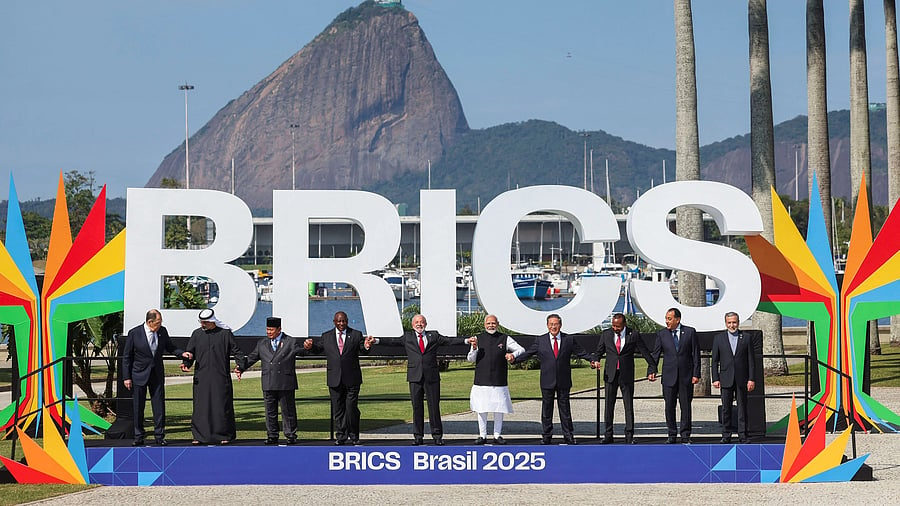
Logically, India has much to lose by hosting a BRICS summit next year, and leading the organisation for the calendar year 2026.
Credit: REUTERS/Pilar Olivares
Saudi Arabia’s de facto ruler Crown Prince Mohammed bin Salman’s grand visit to Washington this week should make foreign policymakers in New Delhi sit up and reconsider their plans for India to assume the presidency of the BRICS group next year. The two are intricately connected, notwithstanding superficial appearances to the contrary at first sight.
United States President Donald Trump is hyper-sensitively antagonistic to the bloc, whose short name denotes Brazil, Russia, India, China, South Africa, but now includes many more emerging economies. In February, Trump threatened a 100% tariff on BRICS members “if they want to play games with the dollar.” In July, Trump wrote on his personal social media platform that “any country aligning themselves with the anti-American policies of BRICS, will be charged an ADDITIONAL 10 percent tariff. There will be no exceptions to this policy.”
Logically, India has much to lose by hosting a BRICS summit next year, and leading the organisation for the calendar year 2026. It will neither be a worthwhile challenge nor will it bring any credit, unlike the Group of Twenty (G20) summit, which India hosted in 2023.
The glittering welcome, which was lavished on the Saudi Crown Prince, popularly known as MbS, is a clear signal that multipolarity, which India has touted in recent years as the sheet anchor of its foreign policy, is ending, at least for as long as the US under Trump remains a wild card in international affairs. The world may yet return to multipolarity in 2029 once Trump is gone and a semblance of normality returns to US foreign policy.
External Affairs Minister S Jaishankar argues in his book, The India Way, that ‘the natural state of the world is multipolarity.’ In the first decade of Narendra Modi’s prime ministership, all decisions in South Block, the seat of Jaishankar’s ministry, were premised on multipolarity. It was Jaishankar, who steered this thrust for most of that time in successive roles. That thrust needs to change. Passing the BRICS presidency next year to another country is a prudent option. It will be a bold step. South Block is not wholly cynical, so it will be a difficult decision.
The most glaring example that multipolarity is no longer working in international affairs is that India has been unable to host the Quad summit this year. This was not for want of trying. It is simplistic to blame Trump for the postponement of this high-profile gathering of India, Australia, Japan, and the US. The reality is that the rationale which created the Quad has changed. The rationale for BRICS has changed too. Its presidency now will be a crown of thorns, which India must firmly refuse. South Block is already weighed under by numerous challenges it is struggling to overcome. It does not need more.
Saudi Arabia has been a de jure BRICS member since January 1, 2024. Yet, it is not a BRICS member in practice. MbS has not attended any BRICS summit since the kingdom’s admission. The last three summits were attended by Saudi Arabia’s Foreign Minister Faisal bin Farhan Al Saud. With this clever balancing act, the kingdom remains in the good books of the US, yet it enjoys all the benefits of a BRICS member state.
Argentina was also to have joined BRICS at the start of 2024. But its Right-wing president, elected two months before the membership deadline, decided to pull out. With such haphazard and directionless expansion — which India has not favoured since the organisation’s second summit in 2010 — Modi would be better off not carrying the baggage of other members in the name of presidential consensus imposed on it. With a presidency devoid of any charm, India and BRICS will then remain in a marriage without joy.
Changes in venues of multilateral meetings are not unheard of. More often than not, such changes are because of contingencies. India has the experience of having had to deal with such an eventuality. In 1982, Baghdad, which was to have been the venue of the seventh Non-Aligned Movement summit, abruptly chickened out after the Iranian Air Force bombed the city’s neighbourhood. Iraq’s President Saddam Hussein endorsed Cuban leader Fidel Castro’s suggestion to move the summit to New Delhi.
In a fresh blow to plurilateralism and multipolar coexistence, this weekend’s G20 summit is likely to be a non-event. Trump is boycotting the summit. Neither Russia’s President Vladimir Putin nor China’s Xi Jinping will be in Johannesburg. Modi must recognise the bizarre note on which the G20 summit will end. South African President Cyril Ramaphosa will hand over the G20 to an empty chair on Sunday. Trump was to take over the G20 reins for the 2026 summit in Miami. But his chair will be empty, like the fate of multilateralism now.
K P Nayar has extensively covered West Asia and reported from Washington as a foreign correspondent for 15 years.
Disclaimer: The views expressed above are the author's own. They do not necessarily reflect the views of DH.